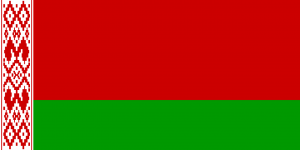Language/Belarusian/Vocabulary/Family
Hi Belarusian learners! 😊
In this lesson, we will learn about Belarusian vocabulary related to family. Family is important in Belarusian culture, and knowing the words for family members will improve your communication skills and help you better understand Belarusian culture.
With the completion of this lesson, consider investigating these related pages: Education, Months of the Year, Traditional Dishes & Feelings and Emotions.
Family Members[edit | edit source]
Belarusian families are usually close-knit, and family members often live together or nearby. Let's learn the names for family members in Belarusian:
| Belarusian | Pronunciation | English |
|---|---|---|
| бацька | bat͡sʲka | father |
| маці | mat͡si | mother |
| сын | syn | son |
| дачка | dačka | daughter |
| брат | brat | brother |
| сястра | sjastra | sister |
| бабуля | babula | grandmother |
| дзедуля | dziedula | grandfather |
| вонук | vanuk | grandson |
| вонуца | vanuca | granddaughter |
Here are some examples of their usage in a dialogue:
- Person 1: Я іду наведацца да бацькі. (I'm going to visit my father.)
- Person 2: А маці яшчэ жыва? (Is your mother still alive?)
Extended Family[edit | edit source]
In Belarus, extended family members play an important role in the lives of individuals. The Belarusian names for extended family members are:
| Belarusian | Pronunciation | English |
|---|---|---|
| татак | tatak | dad, daddy |
| мамуля | mamula | mom, mommy |
| сваёкр | svaokr | father-in-law |
| сваёр | svaor | brother-in-law |
| сваячка | svačka | sister-in-law |
| тэсць | tesc | mother-in-law |
| зять | zjat | son-in-law |
| нярэст | niarest | daughter-in-law |
| шурин | šurin | brother-in-law (married to the wife's sister) |
| швагер | šwager | brother-in-law (married to the husband's sister) |
Here are some examples of their usage in a dialogue:
- Person 1: Сёстрына сваячка прыйшла ў гасці ўчора. (My sister-in-law came to visit yesterday.)
- Person 2: А ў вашай кветці малодшы брат жыве з сям'ёй? (Does your younger brother live with his family in your building?)
Adjectives to Describe Family Members[edit | edit source]
In Belarusian, there are adjectives to describe both immediate and extended family members. Let's learn these adjectives:
| Belarusian | Pronunciation | English |
|---|---|---|
| старэйшы | starejšy | oldest |
| малодшы | malodšy | youngest |
| шчаслівы | ščaslіvy | happy |
| ўжо жанаты | užo žanaty | already married (for a man) |
| ўжо замужам | užo zamuzham | already married (for a woman) |
Here are some examples of their usage in a dialogue:
- Person 1: Гэта мая сястра. Яна малодшая. (This is my sister. She is the youngest.)
- Person 2: Іван твой брат? (Is Ivan your brother?)
- Person 1: Так, ён мой старэйшы брат. (Yes, he is my oldest brother.)
Belarusian Holidays Celebrated with Family[edit | edit source]
In Belarus, family members come together to celebrate holidays. Here are some important holidays celebrated with family in Belarus:
- [| Christmas]: Celebrated on December 25 or January 7, this holiday is usually spent with family and gifts are exchanged.
- [| Kaliady]: Celebrated in the middle of winter and usually accompanied by caroling and traditional meals.
- [| Kupalle]: Celebrated on June 23 or 24, this holiday is accompanied by traditional songs, dances, and a large bonfire.
Here is an example of their usage in a dialogue:
- Person 1: Я люблю сядзець з роднымі на Калядах. (I love spending time with my family during Kaliady.)
- Person 2: Ты любіш хадзіць на маёўнічы пры святкуванні Купалле? (Do you like going to the bonfire during Kupalle?)
To improve your Belarusian Vocabulary, you can also use the Polyglot Club website. Find native speakers and ask them any questions!
Sources[edit | edit source]
➡ If you have any questions, please ask them in the comments section below.
➡ Feel free to edit this wiki page if you think it can be improved. 😎
Other Lessons[edit | edit source]
- Sports
- Transportation
- City
- Education
- Languages
- Days of the Week
- Climate and Weather
- Family Members
- Food Meals Dishes

